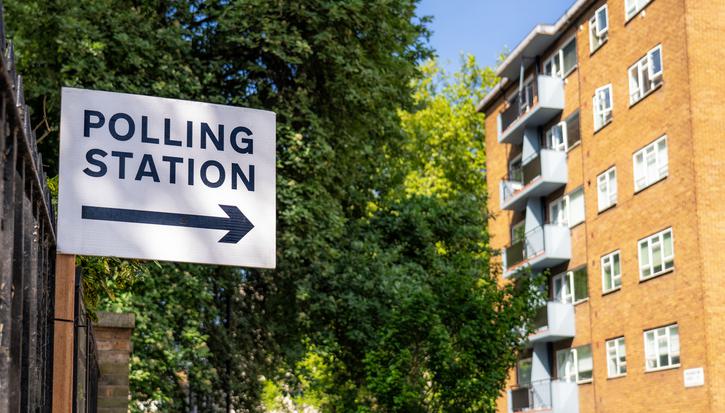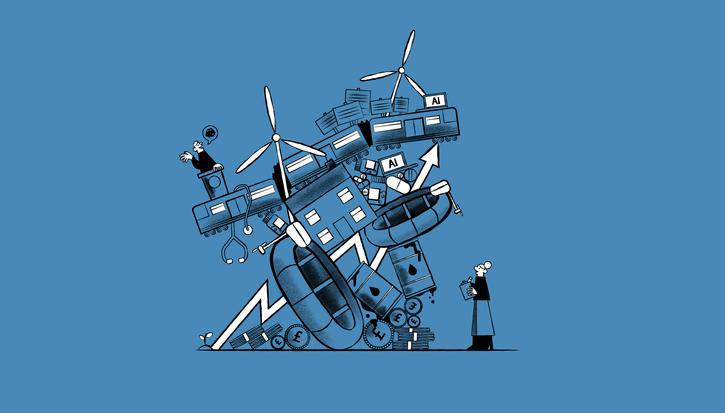The dilemma at the heart of Europe: Germany and the German question
Article
The biggest surprise about Germany's parliamentary election - the results of which are not yet known as I write - is what has not been discussed. The omission is glaring, and it raises fundamental questions about the future not only of Germany but of all Europe.
Let us begin with a very partial list of what was debated, in some cases ad nauseam. Whether or how much the Americans spy on Germans. Whether mothers should use subsidised childcare or keep their toddlers at home. Whether Germans should be discouraged from eating meat on Thursdays. To what extent paedophiles once held sway in the Green party; whether foreigners driving on German motorways should pay toll; whether mothers should get higher pensions. And always, always, that German evergreen: whether the rich are too rich and should forfeit part of their wealth (not just their income) in the name of 'social justice'.
These matters become campaign issues because they are easy to have opinions about. In some cases (spying), they tap into peculiarly German phobias about the invasion of privacy and endemic strains of anti-Americanism. In other cases (childcare), they mobilise reliable legions from old culture wars. Some (meat on Thursdays) reflect the Germanic tendency, best embodied in the Green party, to mix do-goodiness with school-masterly paternalism. And an entire bloc of issues ('social justice') is based on a perennial obsession, one that the Teutons share with the Puritans, which was best defined by the late American journalist HL Mencken as 'the haunting fear that someone, somewhere is having a good time'. (The nuance, by the way, is that Teutons worry about other people having money, Puritans about other people having sex.)
So what was not discussed? In a phrase: the German question. This is not in fact one question but a complex of geostrategic dilemmas that have haunted Europe for centuries. For decades, until reunification, the German question was considered temporarily solved, or at least no longer pressing. But now it is back, rephrased by what is called the 'euro crisis'. It is a question that the eurozone - and really the entire EU - must answer. In this election campaign, then, one would have expected Germany's politicians, above all chancellor Angela Merkel and her challenger Peer Steinbr?ck, at least to begin grappling with it. They did not.
The question, over the centuries, has always had two premises. The first is Germany's geographical centrality. Even today, Germany has more neighbours than any other country in the EU. The second is Germany's 'awkward scale', as Kurt Georg Kiesinger, then chancellor of West Germany, called it in 1967. It is neither huge like America nor tiny like Belgium. It is too small either to dominate ('lead') Europe outright or to exist independently in a world of US, India and China-sized powers. At the same time, it is too big simply to 'get in line', as just another member of the system. Thus Germany may have one vote, equal to Malta's, on the governing council of the European Central Bank. But as supplier of almost 20 per cent of the ECB's capital, its interests and sway cannot be considered equal to Malta's (providing less than 1 per cent of the bank's capital).
Henry Kissinger once phrased this dilemma as 'too big for Europe, too small for the world'. Thomas Mann, Germany's greatest modern writer, expressed essentially the same idea in a famous speech in 1953 as a tension between 'a German Europe' or 'a European Germany'. As the eurozone now decides whether to submit to 'German' rules about fiscal and economic management, and as the EU as a whole decides where its political centre of gravity should sit, they are all in effect asking the same timeless question over and over again.
During the Holy Roman empire of the German nation, the question was about whether the vast area in the middle of Europe would centralise and dominate the continent or stay fragmented and destabilise it (as during the Thirty Years war). After Napoleon dismantled that empire, the question became how these German lands would unite: as a 'greater Germany' with Austria or a 'lesser' one with Prussia but without Austria. Bismarck supplied his answer and Europe responded by trying to balance German power with other alliances. This approach led to the first world war. Afterwards, Europe tried to answer the question by keeping Germany down. Indirectly, this led to the second world war.
After that war, the world - as by now the US was involved - gave not one but two answers. First, the whole world was to be split, and the split was to run through Germany, so that it was no longer at the centre of anything but rather at the edges of something, each of its halves being submerged into one of the two global camps. Second, within western Europe, West Germany voluntarily tried to make the question irrelevant by becoming just another member of an 'ever-closer union', now called the EU. As part of that deal, Germany explicitly ceded political primacy to France and military power altogether, no matter its economic might.
The first part of that double answer became obsolete when the Berlin Wall fell in 1989 and German unification the following year undermined the second part. France, in particular, pushed for a reinforcing of Germany's integration-cum-subservience in the EU by making Germany give up the Deutsche mark, which president Fran?ois Mitterand once called Germany's 'nuclear weapon'. Yes, the successor currency's central bank would be located in Frankfurt to assuage the Germans. But 'Frankfurt' also sounded reassuringly like 'franc fort'. The ultimate point was - staying with Thomas Mann - to keep Germany, and in this case its money, European. As Timothy Garton Ash at Oxford University has put it: 'European monetary union forged during and after German unification was not a German project to dominate Europe but a European project to constrain Germany.'
It is therefore ironic that this same monetary union has, from the point of view of the Greeks or Cypriots or Portuguese, led instead to a Europe made German. Only this feeling can explain the posters of Angela Merkel defaced with Hitler moustaches and swastikas that accompany the distressed and angry citizens of the crisis countries when they take to the streets. It is the iconography of a belief that Germany has in fact become a hegemon over the eurozone. In the protesters' minds, 'austerity' - budget cuts to reduce indebtedness - and simultaneous reforms to make their labour and product markets more competitive within Europe and in the world are 'German' rules, imposed by Mrs Merkel.
From the German point of view, however, the same crisis looks very different. Leave aside for the moment the question of whether austerity is actually effective as policy and whether reforms are politically feasible in this climate. What Germans see is their chancellor failing to impose her will on Europe, that she is at best slowing down the process of pledging more German money to rescues (despite a 'no bail out clause' in the EU treaties that every German seems to know about), paying at best lip-service to new rules (such as the 'fiscal compact'). The Germans do not blame Merkel for this, for they suspect that any chancellor from the opposition parties would have done more of the same, and faster. But Germans see no evidence that they are dominating anybody. Meanwhile, they do see evidence - the Hitler moustaches on Merkel posters and all that - that they are being blamed as if they were.
This situation both irritates and scares Germans. They see that the euro situation is causing old resentments to resurface, and that many of those resentments are directed against Germany. As Dominik Geppert, a historian in Bonn, argues, they also observe 'another disagreeable relic of the past: more and more often Germany's representatives in negotiations at a European level find themselves isolated'. Is this another Sonderweg?
Reared on the lesson that Germany must never again try to be a 'leader' (the word is F?hrer), the German elite is now hearing calls to become just that. 'I fear German power less than I am beginning to fear German inactivity,' the Polish foreign minister Radoslaw Sikorski said in 2011. Soon after that speech, the debate started within German academia, when Christoph Sch?nberger at the University of Constance called for Germany to drop its provincial mindset and become a 'hegemon against its will'.
A hegemon, as defined by the late economic historian Charles Kindleberger and others, is a country that has military, political and economic power, but chooses to use its power not to dominate other countries but to preserve the existing system, even against its own short-term interest, for instance by acting as lender of last resort. Britain during the years of the gold standard comes to mind, or the US more recently. America's refusal to become a hegemon sooner, Kindleberger thought, actually made the Great Depression so long and bad.
Right away, this makes the case for German hegemony problematic. After the second world war, Germany explicitly forswore military and political power. It does have economic power, which it could in theory use to be lender of last resort in the euro crisis. But for the time being, the ECB has stepped into that role.
This points to a particular problem with hegemonic theory in this instance, as Werner Link at the University of Cologne has pointed out. The ECB (like the ESM and all the other acronymised EU-spawned institutions) exists precisely because the system to be preserved - the euro and the EU - was designed so that nobody could ever be a hegemon over it - not Germany, nor France nor Britain, nor any combination of them. Under the EU's horridly complicated voting rules, a decision requires at least 55 per cent of the member states (15 countries) provided these states represent at least 65 per cent of the EU population. The EU's other bodies, such as the ECB, have similar decision-making rules in place. The whole point is that no single country can dominate.
In this context, then, calls for German hegemony in the current systems amount to demands for German money without any other form of German influence - euros without strings. This is what Germans fear: another 'transfer union'. They already have two transfer unions at home, and like neither. The first is the German system of equalising revenues among the 16 federal states, so that strong Bavaria, say, gives money to weak Berlin. The second is a solidarity tax that all Germans have been paying since reunification (due to end in 2019) to send money to eastern Germany. They'd rather not add a third layer for the eurozone.
Geppert argues that the resulting 'semi-hegemony' is in fact the real German dilemma. Germany is damned if it does and damned if it doesn't. If it does insist that recipients of rescue funds observe certain economic rules then it will earn enmity for its 'neo-imperialism'. If Germany instead opens its purse (through debt mutualisation or eurobonds, say) then its own voters, and probably courts, will eventually balk. 'Maastricht' could one day have the ring of 'Versailles', ventures Geppert. Regardless, both scenarios are bad for Europe.
These views are, admittedly, rather pessimistic. Germany and Europe are capable of finding a better course. But the point is that they must begin to talk about how to do this - and all the political parties in Germany during this campaign have done their best to talk about anything else instead. Ju?rgen Habermas, Germany's best-known philosopher today, calls this a 'historical failure of the political elites in Germany'. He believes that these debates would be 'unavoidably polarising'. That they did not occur in Germany in 2013 is a shame.
This article appears in issue 20(2) of Juncture, due out shortly.
Related items

Modernising elections: How to get voters back
Elections are the defining feature of modern democracy. They are the process by which we express a desired future en masse. It is the mass dimension that matters most; it is the mass dimension that is receding.
Bridge to the future: how to get the NHS through the winter and ready for reform
NHS staff across the country are gritting their teeth. Christmas parties have come and gone, but a more threatening annual tradition looms once again – the NHS ‘winter crisis’. This period, renowned for long waits and increased mortality,…
The great enabler: transport’s role in tackling environmental crises and delivering progressive change
In this special issue of IPPR Progressive Review we bring together leading political, academic and civil society thinkers to consider transport in modern Britain and its role in delivering a healthier, greener, more prosperous and…